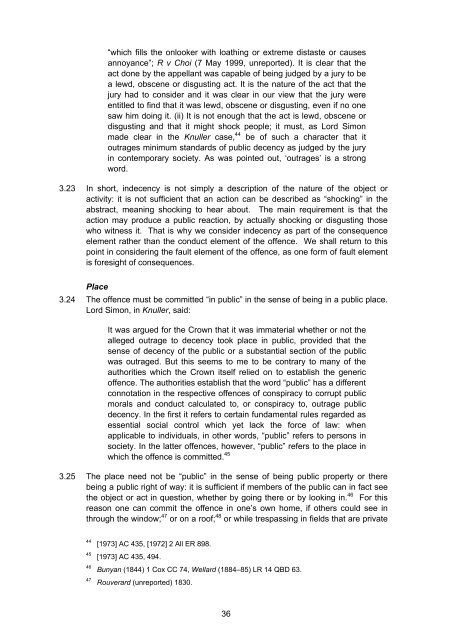public nuisance and outraging public decency - Law Commission
public nuisance and outraging public decency - Law Commission
public nuisance and outraging public decency - Law Commission
You also want an ePaper? Increase the reach of your titles
YUMPU automatically turns print PDFs into web optimized ePapers that Google loves.
“which fills the onlooker with loathing or extreme distaste or causes<br />
annoyance”; R v Choi (7 May 1999, unreported). It is clear that the<br />
act done by the appellant was capable of being judged by a jury to be<br />
a lewd, obscene or disgusting act. It is the nature of the act that the<br />
jury had to consider <strong>and</strong> it was clear in our view that the jury were<br />
entitled to find that it was lewd, obscene or disgusting, even if no one<br />
saw him doing it. (ii) It is not enough that the act is lewd, obscene or<br />
disgusting <strong>and</strong> that it might shock people; it must, as Lord Simon<br />
made clear in the Knuller case, 44 be of such a character that it<br />
outrages minimum st<strong>and</strong>ards of <strong>public</strong> <strong>decency</strong> as judged by the jury<br />
in contemporary society. As was pointed out, ‘outrages’ is a strong<br />
word.<br />
3.23 In short, in<strong>decency</strong> is not simply a description of the nature of the object or<br />
activity: it is not sufficient that an action can be described as “shocking” in the<br />
abstract, meaning shocking to hear about. The main requirement is that the<br />
action may produce a <strong>public</strong> reaction, by actually shocking or disgusting those<br />
who witness it. That is why we consider in<strong>decency</strong> as part of the consequence<br />
element rather than the conduct element of the offence. We shall return to this<br />
point in considering the fault element of the offence, as one form of fault element<br />
is foresight of consequences.<br />
Place<br />
3.24 The offence must be committed “in <strong>public</strong>” in the sense of being in a <strong>public</strong> place.<br />
Lord Simon, in Knuller, said:<br />
It was argued for the Crown that it was immaterial whether or not the<br />
alleged outrage to <strong>decency</strong> took place in <strong>public</strong>, provided that the<br />
sense of <strong>decency</strong> of the <strong>public</strong> or a substantial section of the <strong>public</strong><br />
was outraged. But this seems to me to be contrary to many of the<br />
authorities which the Crown itself relied on to establish the generic<br />
offence. The authorities establish that the word “<strong>public</strong>” has a different<br />
connotation in the respective offences of conspiracy to corrupt <strong>public</strong><br />
morals <strong>and</strong> conduct calculated to, or conspiracy to, outrage <strong>public</strong><br />
<strong>decency</strong>. In the first it refers to certain fundamental rules regarded as<br />
essential social control which yet lack the force of law: when<br />
applicable to individuals, in other words, “<strong>public</strong>” refers to persons in<br />
society. In the latter offences, however, “<strong>public</strong>” refers to the place in<br />
which the offence is committed. 45<br />
3.25 The place need not be “<strong>public</strong>” in the sense of being <strong>public</strong> property or there<br />
being a <strong>public</strong> right of way: it is sufficient if members of the <strong>public</strong> can in fact see<br />
the object or act in question, whether by going there or by looking in. 46 For this<br />
reason one can commit the offence in one’s own home, if others could see in<br />
through the window; 47 or on a roof; 48 or while trespassing in fields that are private<br />
44 [1973] AC 435, [1972] 2 All ER 898.<br />
45 [1973] AC 435, 494.<br />
46 Bunyan (1844) 1 Cox CC 74, Wellard (1884–85) LR 14 QBD 63.<br />
47 Rouverard (unreported) 1830.<br />
36

















